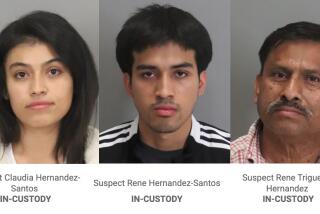Sanctuary Trio Held in Contempt for Refusal to Testify
- Share via
TUCSON — A judge on Tuesday held three sanctuary movement workers in contempt of court and ordered them confined to their homes for refusing to testify in the alien-smuggling trial of 11 religious leaders.
U.S. District Judge Earl H. Carroll ordered the Rev. George Lockwood, a Tucson Methodist, and lay workers Kay Kelly of Tucson and Mary Ann Lundy of New York held until they agree to testify or until the end of the trial, which is in its 16th week.
The defendants were accused of bringing Central American refugees into the United States by an underground railroad, reminiscent of one that operated before the Civil War to smuggle black slaves out of the South.
Carroll stayed enforcement of his civil contempt ruling until Feb. 25 to allow lawyers for the sanctuary workers to appeal to the U.S. 9th Circuit Court of Appeals in San Francisco.
The three, described as “key prosecution witnesses” by Assistant U.S. Atty. Donald M. Reno Jr., will be allowed to leave their homes only for medical attention or to attend weekly religious services. Under the law, the three could have been jailed for up to 18 months.
Some courtroom spectators stood up in silent protest after the contempt ruling. Carroll warned he would hold them in contempt if there were “further demonstrations.”
Attorneys for the three said their clients believe that testifying would violate their right under the First Amendment to free exercise of religion.
Michael Piccarreta, attorney for defendant Margaret Hutchison, 30, of Tucson Metropolitan Ministry, moved that government informant Jesus Cruz and INS agent James Rayburn be held in contempt for giving allegedly false testimony earlier in the trial. Carroll set a hearing for Friday on that motion.
Cruz, who was paid $18,000 for undercover taping of sanctuary meetings, spent six weeks on the stand as the first prosecution witness.
Mark Rosenbaum, Kelly’s attorney, said the government was “selectively seeking” contempt citations against witnesses perceived to be friendly to the Roman Catholic and Protestant defendants on trial.
The case involves clergy and lay workers from Arizona, Texas and Mexico who allegedly operated an underground railroad for people fleeing civil strife in El Salvador and Guatemala.
More to Read
Sign up for Essential California
The most important California stories and recommendations in your inbox every morning.
You may occasionally receive promotional content from the Los Angeles Times.













